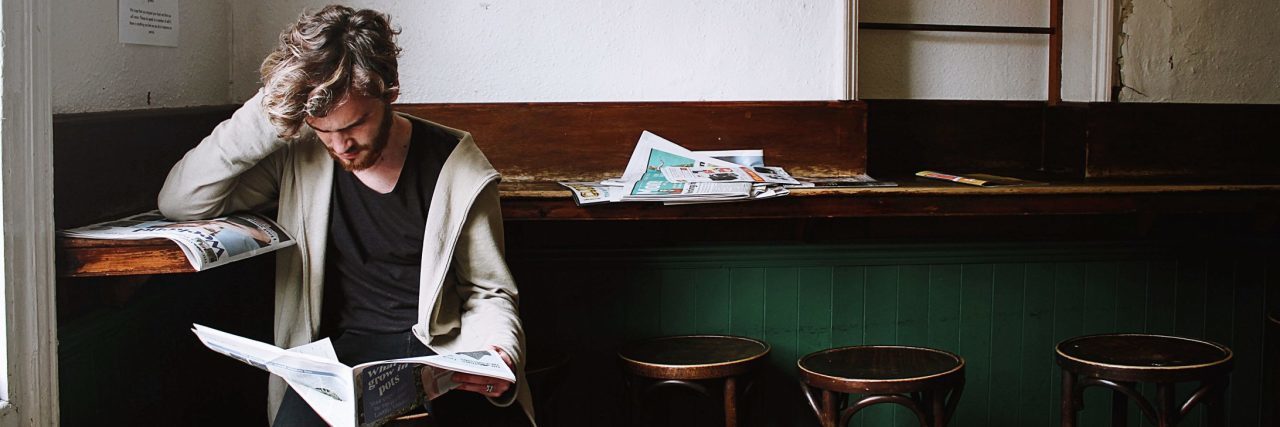A few weekends ago, I was out with my wife and a few friends without the kids. All was great until my wife looked at her phone and just said: “Holy shit, the Oaks.” Without her saying another word, I knew there was a shooting. Just a few cities away from us, at the other big mall in the area, there was a murder by firearm. That made the evening take on a little different tone. It got me thinking about how frequently we hear about shootings at schools and public gatherings and how difficult that must be for someone with anxiety. It’s hard for me because I can’t just tell someone with anxiety that everything is going to be OK because I don’t know that for sure. So, here are some tips for managing anxiety in this crazy ass situation we find ourselves in.
1. It’s absolutely OK to be anxious and scared.
That’s normal. You should feel some degree of anxiety when you hear about a shooting, especially if it is near you or someone you love. That is simply a natural instinct that should be there to help you be appropriately cautious. Anxiety heightens your senses and prepares you for action. Don’t beat yourself up about being anxious in the first place. Of course we want you to be able to bring your anxiety to a manageable level, which is why I have some other tips here.
2. Understand that there is a risk to everything and living life isn’t about denying that risk.
It’s about acknowledging the risk and making an active choice to move forward. You could make an endless list of the things that could possibly harm you every time you walk out the door. However, people are still moving about the world, living their lives. As humans, we never feel 100 percent certain about our safety and we never feel 100 percent secure in the decisions we make. That doesn’t mean they aren’t good decisions. That’s just human nature. We make a choice and go with it. It’s just what we do.
3. It’s unlikely to happen to you.
I know you’ve heard this a million times, but it’s also important to recognize that it is still statistically very unlikely that you will be involved in a mass shooting. I will 10,000 percent agree that it happens way too frequently and there is work to be done to change that fact, but it still stands that the statistics are on your side.
4. Remember that the media has biased coverage.
Very rarely does the media (or social media for that matter) cover the random good stuff that happens all day, every day. If they do, they surely only devote about one percent of their coverage to the good things. Scary and dramatic events are more alluring and make people feel like they are getting the most important information. This is very similar to the “mental filter” thinking trap we often fall into where we see all of the negative aspects of a scenario and filter out all of the positive, leading to feelings of sadness or anxiety.
5. Thinking about it won’t make it happen.
No matter how much you think about a potential shooting or how often you see people tweet about shootings that have happened, that does not increase the likelihood of it happening to you. We often feel that if we think about something too much or it is heavy on our minds, it is more likely to happen. Unfortunately (or fortunately) we don’t actually have that much power over the universe.
6. It’s OK to avoid specifics.
You don’t need to feel guilty about not knowing every single detail at the exact moment it happens. It’s definitely important to check and understand what is unfolding and make sure that you and your loved ones are not at risk, but if you can’t handle every nitty gritty detail while you are at your kid’s soccer match, there is nothing wrong with catching up on the news a little later. There is this strange sense of guilt that we seem to place on ourselves when we are not constantly jacked in and aware of every single thing happening in the world. You knowing every detail does not change anything about the event that has actually happened. It only changes when you know about it.
7. Do something productive with the sense of unease.
I’m not going to get overtly political here, but if you feel there is something that can be done to affect change on a systemic level, write a letter, make a phone call or write something that you feel contributes to that. Even though you have no control over the event that has occurred, feeling like you can play some sort of an active role may help alleviate some of the hopelessness.
We want to hear your story. Become a Mighty contributor here.
Photo by Toa Heftiba on Unsplash

